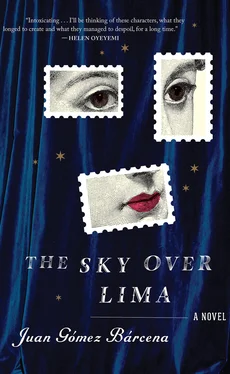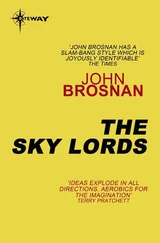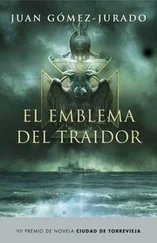What would he do if Georgina were one of them? Would he recognize her? Would he request her company? Would he tell his father, The Hübners are the best family for us ?
Some of the girls he receives are pretty, but Carlos doesn’t even notice. He’s spent his whole life looking at cartoons and postcards of women as if they were flesh and blood, and now he is looking at the parade of flesh-and-blood women as if it were a well-worn deck of postcards and cartoons. Characters taken from a novel that has been closed and forgotten. Georgina, on the other hand… Because only when he thinks about her is the burden on his chest alleviated, as if someone had made his father get up and leave the room. As if what he senses on his body were not pressure but the lightest touch of a caress, so delicate that he has to close his eyes just to feel it. It is Georgina, coming to visit him. Or not, but what does it matter? It’s better not to open his eyes so he can keep believing it, or to open them and see her at last, because she is not like the others. She is not interested in the drapes or the etchings or the silverware. Georgina wants to look at him — only at him.
◊
And then the novel grinds to a halt.
They know, having gleaned it from one of the few pieces of Professor Schneider’s advice they actually managed to read, that something extraordinary must take place in the middle pages of every novel. Just before that episode, the plot must seem to falter for a moment — the beginning of the second act — passing through a low spot or valley, a brief plateau of boredom, and then that something happens. Often a character who seemed indispensable to the story dies, or maybe one who seemed like he was going to die survives. The others learn to appreciate life more, or perhaps they don’t learn anything. And that’s that.
But their novel will never emerge from that valley. It simply ends, before the peak has even been contemplated. It is brusquely interrupted, like a volume from which the last pages have been torn out: Juan Ramón has stopped answering their letters. A week passes, then two, a month — an entire month goes by and still they have no word from the Maestro. The day comes again when the ship should arrive from Europe, and nothing happens. What they do have is plenty of time to come up with explanations. The Maestro has grown bored; the Maestro has found a novel or a muse more to his liking; the Maestro has forgotten about the tiresome girl from Miraflores and their disjointed, humdrum novel. The Maestro isn’t a Maestro at all but an imbecile who needs to be taught good manners, the proper way to treat well-bred young ladies. And of course they have time to blame themselves — such mediocre writers — and others, too, obviously: Professor Cristóbal, and Don Augusto, why not, and Professor Nicanor — Mr. Scrooge — who has given them failing grades in his mercantile law course, and the watchman who doesn’t trust the Chinese, and the servant who has no doubt mixed up or misplaced the envelopes, and other characters so marginal that they haven’t even appeared in their novel.
Then comes something akin to resignation. What else can they do but wait? And fib a bit when asked about it in the club — Of course we have; two more letters, three actually; you should read the latest poem he sent, dedicated to Georgina. Maybe they lie out of pride. Or maybe they are waiting for reality to accommodate itself to their words. But one night one of the lads at the club seems unusually interested in their responses.
“So he just wrote you, then!” he says, feigning admiration. “And three letters, no less! What does the brilliant poet have to say for himself?”
José and Carlos exchange an awkward glance.
“Well, mostly the same as always…”
“The same as always, is it?”
“Yes… Nothing special. The important thing is that the novel continues. The novel continues.”
The chap starts to laugh, and two or three other patrons laugh with him.
“Well, since you didn’t get those letters via the Wright brothers’ flying bicycle, I highly doubt you actually had the chance to read them.”
“What do you mean?”
He becomes stern.
“Do you two live on the moon or something? You must be the only people in Lima who don’t know.”
“Know what?”
“Not a single ship has entered or left the port at El Callao for weeks. Sandoval’s strike has begun.”
◊
To find out, they would only have had to read one of Lima’s five newspapers or forty broadsheets — specifically, the front page of any of them. But neither Carlos nor José reads the newspaper. Nor do they attend their labor law class, in which the El Callao dockworkers have been the subject of lengthy and contentious discussion over the past several days. It’s been weeks since either of them has set foot in the halls of the university. Or Carlos could simply have bothered to listen to his own mother’s prayers, whose novenas and rosaries have, of late, made mention of the strikers. She asks the Lord for there to be peace in Peru and for everyone in the port to go back to being as happy as they used to be, and the Lord will end up listening to her sooner or later, because the Lord always answers the prayers of those who wish for nothing to change.
His father is well informed on the topic and is delighted when Carlos asks him about it. At last his son is showing some interest in business. He tells him about the thirty-five ships anchored in the port. The fourteen thousand tons of rubber going nowhere. The influx of dollars lost every day because of this preposterous wait and the deuced forces of order, which used to do just what their name suggests — impose order by force — and now allow a bunch of jobless, godless layabouts to humiliate the entire country.
“But what is it they’re asking for?” Carlos ventures.
“What is it they’re asking for? Anarchy! You know what anarchy is?”
Carlos says he does. Don Augusto keeps talking.
“Of course, they claim they’re fighting for equality and justice and who knows what other noble ideas… but nobody actually cares about those things! The workers aren’t fighting for justice — they’re fighting to become bosses themselves. It’s the law of life! And the strikers have this novel idea that they’re going to get rich working just eight hours a day… what do you think of that? You think I got where I am working eight goddamn hours a day?”
No, Carlos does not.
That very morning, as he is reading the newspaper in an effort to get up to date, one of the housemaids comes in to gather up the dishes from breakfast. Without looking up from the papers, almost idly, Carlos says:
“Even you must have heard about the El Callao strike.”
The maid stops short, still holding the tray.
“Is it because of my brother, sir?”
“Your brother?”
She bites her lip.
“My brother Antonio, the one who works in the port. He’s on strike with all the others — it’s no secret.”
“I understand.”
“But I’m not like him, sir. You don’t have to worry about me. I’m not going to cause any trouble.”
“Of course not, of course not.”
They stare at each other for a few moments. Perhaps the tray clatters in the maid’s trembling hands.
“So tell me… do you know why they’re on strike in the docks?”
The maid answers swiftly.
“I don’t know. I don’t understand those things.”
And then, calmer:
“But I think it’s because of the length of the workday, sir. They want to work eight hours, can you believe it? Eight hours a day!”
She tries to laugh, but it catches in her throat. She tries to control her heartbeat, afraid the clattering of the dishware might offend the young master.
Читать дальше












